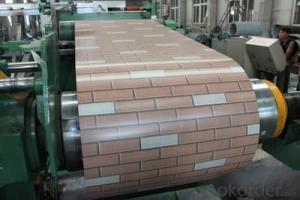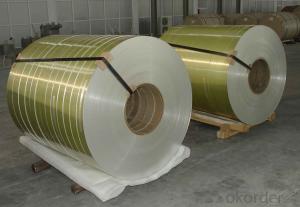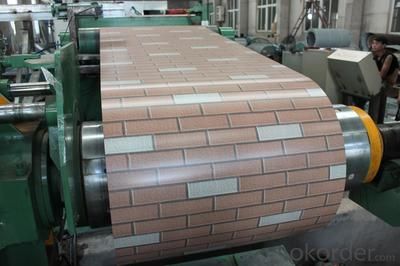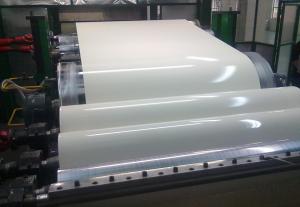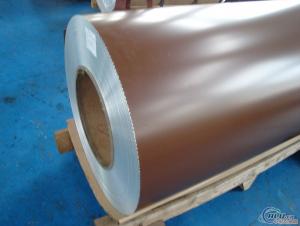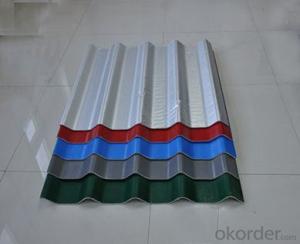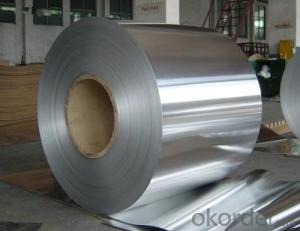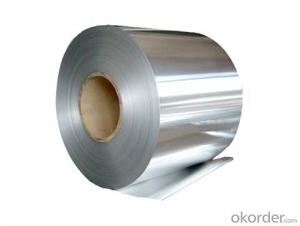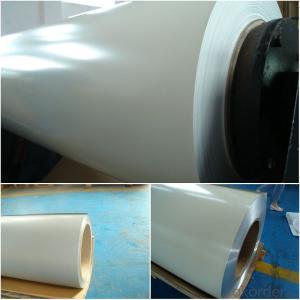Aluminum Sheet Coil for Solar Cell Frame - Color Coated Houston
- Loading Port:
- Shanghai
- Payment Terms:
- TT OR LC
- Min Order Qty:
- 5 m.t.
- Supply Capability:
- 50000 m.t./month
OKorder Service Pledge
OKorder Financial Service
You Might Also Like
Specification
Color Coated Aluminium Roll For Solar Cell Frame
Specifications
Grade | 1050,1060,1070, 1100, 1200, 2024,3003, 3004,3005, 3105, 5005,5052 5182,5754,8011 etc |
Thickness | 0.1~1.5mm |
Width | 100~2500mm |
Surface Treatment | PVDF and PE coated |
Temper | O-H112 |
Hardness | More than 2H |
Yield(≥MPa) | 160 |
Ultimate Strength(≥MPa) | 175 |
Elongation(≥%) | 6 |
Packing Material | Moisture-proof agent, steel tape bundle, wooden pallet, brown paper |
Method | Vertical(eye to sky) or horizontal(eye to wall) |
Standard Specification | 1000mm×C, 1200mm×C, etc |
Shipping | Container Loading or Bulk Pack |
Characteristics
1) Excellent weather-proof durability
2) Anti-ultraviolet
3) High erosion resistance
4) Stable color and gloss
5) Good mechanical processing performance
6) Abrasion resistance
7) Anti-impact
8) High flexibility
Application
1) Construction material further processing
2) Solar cell frame, solar battery frame
3) Glass curtain wall frame
4) Interior decoration
5) Elevator decoration
6) Signs, nameplate, bags making.
7) Automobile parts material
8) Office and Household appliances: HVAC equipments
9) The consumer electronics: mobile phones, digital cameras, MP3 .etc.
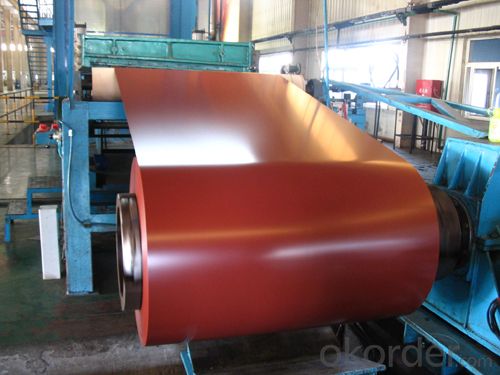
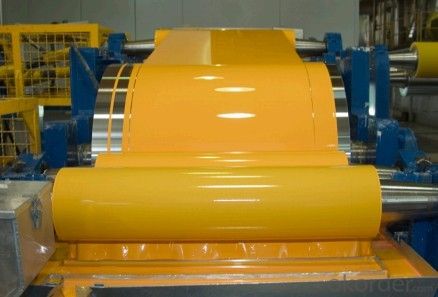
Coating varieties
Polyester Coatings (PE)
PE (polyester) coatings exhibit an excellent combination of hardness, flexibility, flow, appearance, and superior resistance to dirt retention in indoor and outdoor applications. These coatings are highly resistant to abrasion, metal marking, staining, and marring, and require minimal maintenance. Glazetech uses polyester paints which provide excellent colour and gloss retention properties.
Polyvinylidene Fluoride Coatings (PVDF)
PVDF (polyvinylidene fluoride) is a chemical resistant thick film barrier coating commonly used in architectural applications where both excellent appearance and substrate protection must be maintained over a long period of time. This coating is unaffected by most chemicals and solvents and has excellent wear and abrasion resistance. PVDF also has a high dielectric strength, excellent resistance to weathering and the ability to self extinguish.
FAQ
--Q: Do you provide free samples?
--A: Yes, free samples will be sent to you on freight at destination.
--Q: Can I get your latest products catalogue?
--A: Yes, it will be sent to you in no time.
--Q: What is the MOQ?
--A: 2 tons
--Q: What are your payment terms?
--A: We accept L/C, T/T.
--Q: What kinds of alloy can you supply?
--A: 1000 series: 1050, 1060, 1070, 1100, 1145, 1200
3000 series: 3003, 3004, 3105, 3104
5000 series: 5052, 5083, 5754, 5182
6000 series: 6061, 6063, 6062, 6063
8000 series: 8011, 8021
--Q: What’s the coating of top side?
--A: PVDF and PE coating
--Q: What kinds of temper can you supply?
--A: O-H112: O,H12,H14,H16,H18,H22,H24,H26,H,32,H34,H111,H112, T3, T4, T6
- Q: How much is a ton gate of Jiangxi aluminium roll?
- Roll gate installation guide and measurement:The height h (the ground to the top of the doorway height);The table width (the distance between left to right, generally can be divided into single, double, three car garage);H (the height of lintel beam bottom to the height of the ceiling. If there is a beam or stringer in the room, it should be calculated as the distance between the top of the hole and the beam;
- Q: What role does the powdered aluminum play in this reaction?
- Aluminium okorder /
- Q: Are there any restrictions on the coil flatness of aluminum coils?
- Yes, there are restrictions on the coil flatness of aluminum coils. The industry standards specify acceptable tolerances for coil flatness to ensure the quality and usability of the aluminum coils. These restrictions help prevent any deformation or irregularities in the coils, ensuring they meet the required specifications for various applications.
- Q: Can aluminum coils be used for HVAC condenser coils?
- Indeed, HVAC condenser coils can utilize aluminum coils. In recent times, aluminum coils have gained significant popularity owing to their myriad benefits over conventional copper coils. With their lighter weight and enhanced durability, aluminum coils exhibit superior resistance to corrosion. Additionally, they boast exceptional heat transfer properties that enable efficient refrigerant cooling. Furthermore, aluminum coils prove to be more cost-effective and environmentally sustainable in comparison to copper coils. All in all, opting for aluminum coils for HVAC condenser coils is a viable and advantageous choice.
- Q: Are aluminum coils suitable for roofing applications?
- Indeed, roofing applications can indeed make use of aluminum coils. Aluminum, as a material, possesses the qualities of being lightweight and durable, thus making it advantageous for roofing projects. In terms of corrosion resistance, aluminum excels, which is crucial in safeguarding roofs from weather elements like rain, snow, and UV radiation. Furthermore, aluminum is fire-resistant, ensuring safety in roofing applications. Moreover, aluminum coils possess high malleability, allowing for effortless shaping and installation on various roof designs. They are also obtainable in an extensive array of colors and finishes, providing aesthetic choices for different architectural styles. All in all, the durability, versatility, and aesthetic appeal of aluminum coils contribute to their popularity in roofing applications.
- Q: Are aluminum coils suitable for air conditioning systems?
- Air conditioning systems can utilize aluminum coils, which are commonly employed due to their numerous advantages. Firstly, aluminum, being a lightweight material, facilitates ease of handling and transportation during installation. Additionally, this lightweight characteristic reduces the unit's overall weight, rendering it more energy-efficient. Moreover, aluminum coils possess exceptional heat transfer properties, thereby enabling efficient air cooling. They exhibit enhanced thermal conductivity, facilitating rapid and effective heat transfer. Consequently, this leads to improved cooling performance and enhanced energy efficiency, resulting in reduced electricity consumption and long-term cost savings. Furthermore, aluminum coils surpass other materials, such as copper, in terms of superior corrosion resistance. Given the exposure of air conditioning systems to moisture and humidity, this resistance is crucial. Aluminum coils can withstand these conditions without corroding or deteriorating, ensuring a longer lifespan and reliable performance. Another advantage of aluminum coils lies in their affordability. Aluminum is a cost-effective material, making it a favored choice among air conditioning manufacturers. This affordability subsequently translates into lower costs for consumers, making air conditioning systems more accessible and economically viable. In conclusion, the suitability of aluminum coils for air conditioning systems is evident due to their lightweight nature, impressive heat transfer properties, corrosion resistance, and affordability. They offer efficient cooling capabilities, durability, and cost-effectiveness, establishing themselves as the preferred choice for air conditioning units.
- Q: How do aluminum coils compare to copper coils in terms of performance?
- Aluminum coils and copper coils are two common types of heat exchanger coils used in heating, ventilation, and air conditioning (HVAC) systems. While both materials are effective in transferring heat, they do differ in terms of performance. Copper coils have long been the preferred choice for HVAC systems due to their superior heat transfer properties. Copper is an excellent conductor of heat, allowing for efficient transfer of thermal energy. This means that copper coils can cool or heat the surrounding air more effectively, resulting in faster and more efficient temperature control. On the other hand, aluminum coils are less efficient in terms of heat transfer compared to copper coils. Aluminum is a poorer conductor of heat, which means that it requires a larger surface area to achieve the same level of heat transfer as copper. Consequently, aluminum coils tend to be larger in size to compensate for their lower heat transfer capabilities. However, aluminum coils do have some advantages over copper coils. Firstly, aluminum is a lightweight material, making it easier to handle and install. This can be particularly beneficial in situations where weight restrictions or handling limitations are a concern. Secondly, aluminum coils are more resistant to corrosion compared to copper coils. Copper is prone to corrosion over time, especially in environments with high humidity or exposure to certain chemicals. Aluminum, on the other hand, naturally forms a protective oxide layer that helps prevent corrosion. This can result in longer-lasting coils and a lower likelihood of refrigerant leaks. In summary, while copper coils offer superior heat transfer capabilities, aluminum coils have their own advantages such as lighter weight and better corrosion resistance. The choice between aluminum and copper coils ultimately depends on the specific requirements of the HVAC system, including the desired performance, budget, and environmental factors.
- Q: Can aluminum coils be used in electrical cables?
- Yes, aluminum coils can be used in electrical cables. Aluminum is commonly used as a conductor in high-voltage power transmission cables due to its lighter weight and lower cost compared to copper. However, it is important to note that aluminum has higher resistivity than copper, so larger cross-sectional areas are required to achieve the same level of conductivity. Additionally, special connectors and jointing techniques are necessary to account for the differences in thermal expansion and electrical conductivity between aluminum and other materials used in electrical systems.
- Q: What are some common defects in aluminum coils?
- Some common defects in aluminum coils include surface scratches, dents, uneven thickness, edge wave, oil stains, and pitting.
- Q: I have completely disassembled my aluminum bass boat and it is being sandblasted.I am restoring the boat and will be giving it a new paint job.What do you recommend in the way of primer,paint or anything else I need to know.I just don,t want to mess it up by using the wrong thing.Best answer gets a fishing trip in the same boat we are talking about. If you can make it here I will put you on some fish.Catfish,bream,crappie,bass or even saltwater fish.
- Contact the manufacture and see what they used as it held up for quite a few yrs. Primer for aluminum is the beginning.
Send your message to us
Aluminum Sheet Coil for Solar Cell Frame - Color Coated Houston
- Loading Port:
- Shanghai
- Payment Terms:
- TT OR LC
- Min Order Qty:
- 5 m.t.
- Supply Capability:
- 50000 m.t./month
OKorder Service Pledge
OKorder Financial Service
Similar products
Hot products
Hot Searches
Related keywords
